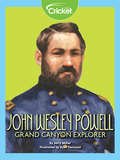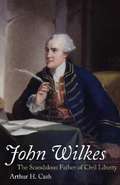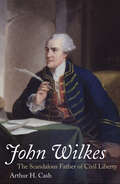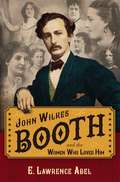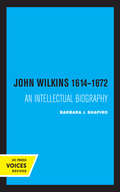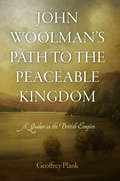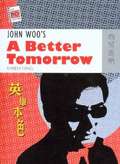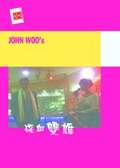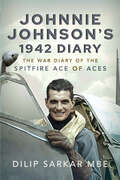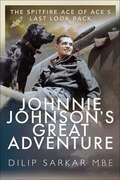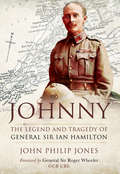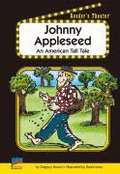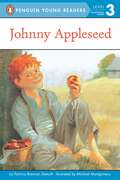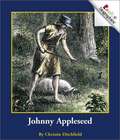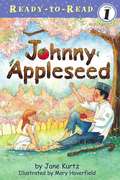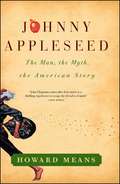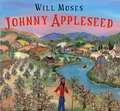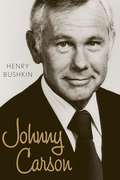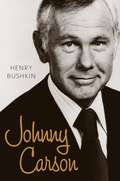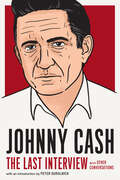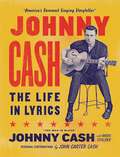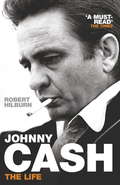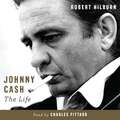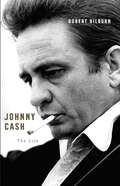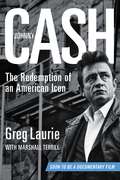- Table View
- List View
John Wesley Powell: Grand Canyon Explorer
by Jerry MillerJohn Wesley Powell was known for his explorations of the canyon land area of southern Utah and northern Arizona, still "unknown" in the 1860s.
John Wilkes: The Scandalous Father of Civil Liberty
by Arthur H. CashThis book is about an audacious journalist and politician who was born in the City of London in 1726 and died in the City of Westminster in 1797, his life spanning a time that included the American Revolution, which he admired, the French Revolution, which he hated, and the industrial revolution, which he did not know was happening.
John Wilkes: The Scandalous Father of Civil Liberty
by Arthur H. CashPulitzer Prize Finalist: A biography of the wildly colorful eighteenth-century British politician who became &“the toast of American revolutionaries&” (Booklist). One of the most colorful figures in English political history, John Wilkes (1726–97) is remembered as the father of the British free press, a defender of civil and political liberties—and a hero to American colonists. Wilkes&’s political career was rancorous, involving duels, imprisonments in the Tower of London, and the Massacre of St. George&’s Fields, in which seven of his supporters were shot to death by government troops. He was equally famous for his &“private&” life—as a confessed libertine, a member of the notorious Hellfire Club, and the author of what has been called the dirtiest poem in the English language. This lively biography draws a full portrait of John Wilkes from his childhood days through his heyday as a journalist and agitator, his defiance of government prosecutions for libel and obscenity, his fight against exclusion from Parliament, and his service as lord mayor of London on the eve of the American Revolution. Told here with the force and immediacy of a firsthand newspaper account, Wilkes&’s own remarkable story is inseparable from the larger story of modern civil liberties and how they came to fruition. &“[Does] justice to Wilkes both as a fiery proponent of individual rights and as . . . a libertine par excellence in an age with no shortage of memorable rakes.&” —The New York Times &“It is difficult to believe that John Wilkes, a notorious womanizer and scandal-monger, was a genuine hero of civil liberties and political democracy on both sides of the Atlantic in the late 18th century, but hero he was and in this engaging book Arthur Cash gives Wilkes the serious treatment he has long deserved.&” —Eric Foner, Winner of the Pulitzer Prize in History and New York Times–bestselling author of Reconstruction
John Wilkes Booth and the Women Who Loved Him
by E. Lawrence AbelWhen John Wilkes Booth died—shot inside a burning barn and dragged out twelve days after he assassinated President Lincoln—all he had in his pocket were a compass, a candle, a diary, and five photographs of five different women. They were not ordinary women. Four of them were among the most beautiful actresses of the day; the fifth was Booth's wealthy fiancée. And those five women are just the tip of the iceberg. Before he shot the president of the United States and entered the annals of history as a killer, actor John Wilkes Booth had quite a way with women. There was the actress who cut his throat and almost killed him in a jealous rage. There was the prostitute who tried to kill herself because he abandoned her. There was the actress who would swear she witnessed him murdering Lincoln, even though she was thousands of miles away at the time. John Wilkes Booth was hungry for fame, touchy about politics, and a notorious womanizer. But this book isn't about John Wilkes Booth---not really. This book is about his women: women who were once notorious in their own right; women who were consumed by love, jealousy, strife, and heartbreak; women whose lives took wild turns before and after Lincoln's assassination; women whom have been condemned to the footnotes of history... until now.
John Wilkins 1614-1672: An Intellectual Biography
by Barbara J. ShapiroThis title is part of UC Press's Voices Revived program, which commemorates University of California Press’s mission to seek out and cultivate the brightest minds and give them voice, reach, and impact. Drawing on a backlist dating to 1893, Voices Revived makes high-quality, peer-reviewed scholarship accessible once again using print-on-demand technology. This title was originally published in 1969.
John Woolman's Path to the Peaceable Kingdom
by Geoffrey PlankThe abolitionist John Woolman (1720-72) has been described as a "Quaker saint," an isolated mystic, singular even among a singular people. But as historian Geoffrey Plank recounts, this tailor, hog producer, shopkeeper, schoolteacher, and prominent Quaker minister was very much enmeshed in his local community in colonial New Jersey and was alert as well to events throughout the British Empire. Responding to the situation as he saw it, Woolman developed a comprehensive critique of his fellow Quakers and of the imperial economy, became one of the most emphatic opponents of slaveholding, and helped develop a new form of protest by striving never to spend money in ways that might encourage slavery or other forms of iniquity.Drawing on the diaries of contemporaries, personal correspondence, the minutes of Quaker meetings, business and probate records, pamphlets, and other sources, John Woolman's Path to the Peaceable Kingdom shows that Woolman and his neighbors were far more engaged with the problems of inequality, trade, and warfare than anyone would know just from reading the Quaker's own writings. Although he is famous as an abolitionist, the end of slavery was only part of Woolman's project. Refusing to believe that the pursuit of self-interest could safely guide economic life, Woolman aimed for a miraculous global transformation: a universal disavowal of greed.
John Woo's A Better Tomorrow
by Karen Fang'A Better Tomorrow' has always been hailed as a milestone in Hong Kong cinema. This book describes the different responses to the movie in Hong Kong and later in its reception worldwide, which paved the way for the promotion of John Woo and Chow Yun-fat to their current prominence in Hollywood. Fang examines the different notions of the genre of action cinema in Asian and Western film industries. She tracks the connections between ying shung pian, or "hero" movie, the term by which Woo's film became famous in Hong Kong, and the spectacle of violence emphasized in the term "heroic bloodshed," the category in which the film was known in the West. Finally, she concludes with a discussion of the status of the film and its huge success in the current globalized industry.
John Woo's The Killer
by Kenneth E. HallA classic tale of loyalty and bloody betrayal, John Woo's 'The Killer' (1989) was centrally important to the growth of Hong Kong cinema in the 1980s and 1990s. It helped launch the international stardom of Woo and lead actor Chow Yun-fat, who plays a disllusioned hitman taking his fatal final assignment to help a lounge singer he accidentally blinded. Illustrating the film's place in the chivalric tradition of Chinese and Hong Kong cinema, where cops and noble villains sometimes join forces in defense of traditional virtues and personal honor, Kenneth Hall documents the strong influence of Woo's mentor Chang Cheh as well as Jean-Pierre Melville and other film noir pioneers. Hall also analyzes the film's influence on other directors, including Robert Rodriguez and Quentin Tarantino.
Johnnie Johnson's 1942 Diary: The War Diary of the Spitfire Ace of Aces
by Dilip SarkarA unique insight into how fighter pilots lived, loved—and died—through the diary of the top-scoring RAF Ace who survived the Battle of Britain. A one-time household name synonymous with the superlative Spitfire, Air Vice-Marshal &“Johnnie&” Johnson&’s aerial combat successes of World War II inspired schoolboys for generations. As a &“lowly Pilot Officer,&” Johnson learned his fighter pilot&’s craft as a protégé of the legless Tangmere Wing Leader, Douglas Bader. After Bader was brought down over France and captured on 9 August 1941, Johnnie remained a member of 616 (South Yorkshire) Squadron. By the beginning of 1942, when Johnnie&’s diary begins, Fighter Command was pursuing an offensive policy during daylight hours, &“reaching out&” and taking the war to the Germans in France. It was also a period in which the Focke-Wulf Fw outclassed the Spitfire Mk.V. In Johnnie&’s words, the Fw 190 &“drove us back to the coast and, for the first time, pilots lost confidence in the Spitfire.&” As well as his participation in Rhubarb and Circus sorties, Johnnie was also involved in Operation Jubilee on 19 August 1942. In this diary, published here for the first time, we get a glimpse of the real Johnnie, and what it was really like to live and breathe air-fighting during one of the European air war&’s most interesting years: 1942. Presented on a day-by-day basis, each of Johnnie&’s entries is supported by an informative narrative written by the renowned aviation historian Dilip Sarkar, drawing upon official documents and his interviews and correspondence with the great man. &“Provides a number of insights into life in the RAF Fighter Command of that period.—Most Highly Recommended.&” —Firetrench
Johnnie Johnson's Great Adventure: The Spitfire Ace of Ace's Last Look Back
by Dilip SarkarThe World War II fighter Ace&’s previously unpublished draft—an account of the &“Long Trek&” from Normandy into the heart of the Third Reich itself. Having published two of his own books, Wing Leader and The Circle of Air Fighting, Air Vice-Marshal Johnnie Johnson co-authored several more with another fighter ace, namely Wing Commander P.B. &“Laddie&” Lucas. In 1997, the &“AVM&” suggested to his friend, the prolific author Dilip Sarkar, that the pair should collaborate on The Great Adventure. &“Greycap Leader&” was to produce a draft, after which Dilip would add the historical detail and comment. Sadly, the project was unfulfilled, because Johnnie became ill and passed away, aged eighty-five, in 2001. Years later, Johnnie&’s eldest son, Chris, discovered the manuscript among his august father&’s papers. In order to keep Johnnie&’s memory evergreen, Chris turned to Dilip to finally see the project through to its conclusion. In this book Johnnie revisits certain aspects of his wartime service, including the development of tactical air cooperation with ground forces; his time as a Canadian wing leader in 1943, when the Spitfire Mk IX at last outclassed the Fw 190; and details his involvement in some of the most important battles of the defeat of Nazi Germany, including Operation Overlord and the D-Day landings in 1944, Operation Market Garden and the airborne assault at Arnhem, and the Rhine Crossings, throughout all of which Johnnie also commanded Canadian wings. Johnnie Johnson&’s Great Adventure &“brings to life the man of the book in such an interesting and heroic manner . . . if it wasn&’t for these brave heroes we might not have won the war&” (UK Historian).
Johnny: The Legend and Tragedy of General Sir Ian Hamilton
by John Philip JonesThe Gallipoli campaign was launched in April 1915 in an effort to knock Turkey out of the war but the force that was deployed was too small to achieve its aim. Moreover, the commander, General Sir Ian Hamilton was at fault in the way he conducted his campaign. Never happier than when he was in the thick of action, Hamilton was an excellent tactician but, by 1915, and in a situation like Gallipoli, his style of leadership was outdated. This book examines why Hamilton failed at Gallipoli and shows how, in spite of that failure and it being his last command, he became a well-respected military prophet who many several perceptive predictions about the future of warfare.
Johnny Appleseed: An American Tall Tale
by Gregory Brown Karen Leon Jeffrey FuerstPerform this American tall tale about Johnny Appleseed.
Johnny Appleseed (Penguin Young Readers, Level 3)
by Patricia Brennan DemuthWith a bag of seeds and a pot on his head, John Chapman set out West to plant apple trees. He made lots of friends and planted lots of trees. Pretty soon, people started to call him Johnny Appleseed.
Johnny Appleseed (Rookie Biographies)
by Christin DitchfieldPresents a brief biography of John Chapman, the man who planted Thousands of apple seeds in the early nineteenth century.
Johnny Appleseed
by Mary Haverfield Jane KurtzWho's that walking along the Ohio? It's Johnny Appleseed! He walks across the land, planting trees wherever he goes. So, everyone, clap your hands for Johnny Appleseed!
Johnny Appleseed
by Howard MeansThis portrait of Johnny Appleseed restores the flesh-and-blood man beneath the many myths. It captures the boldness of an iconic American life and the sadness of his last years, as the frontier marched past him, ever westward. And it shows how death liberated the legend and made of Johnny a barometer of the nation's feelings about its own heroic past and the supposed Eden it once had been. It is a book that does for America's inner frontier what Stephen Ambrose's Undaunted Courage did for its western one. No American folk hero--not Davy Crockett, not even Daniel Boone--is better known than Johnny Appleseed, and none has become more trapped in his own legends. The fact is, John Chapman--the historical Johnny Appleseed--might well be the best-known figure from our national past about whom most people know almost nothing real at all. One early historian called Chapman "the oddest character in all our history," and not without cause. Chapman was an animal whisperer, a vegetarian in a raw country where it was far easier to kill game than grow a crop, a pacifist in a place ruled by gun, knife, and fist. Some settlers considered Chapman a New World saint. Others thought he had been kicked in the head by a horse. And yet he was welcomed almost everywhere, and stories about him floated from cabin to cabin, village to village, just as he did. As eccentric as he was, John Chapman was also very much a man of his times: a land speculator and pioneer nurseryman with an uncanny sense for where settlement was moving next, and an evangelist for the Church of the New Jerusalem on a frontier alive with religious fervor. His story is equally America's story at the birth of the nation. In this tale of the wilderness and its taming, author Howard Means explores how our national past gets mythologized and hired out. Mostly, though, this is the story of two men, one real and one invented; of the times they lived through, the ties that link them, and the gulf that separates them; of the uses to which both have been put; and of what that tells us about ourselves, then and now.
Johnny Appleseed: The Story of a Legend
by Will MosesJohnny Appleseed was a legend even in his own time-stories abounded about the kindhearted woodsman who planted thousands of apple seeds from Pennsylvania to Indiana. The real Johnny Appleseed was born John Chapman in a small village in Massachusetts. When he was a young man, he set off for the western frontier and along the way collected bags of apple seeds from cider mills. As John Chapman's apple orchards grew in number, so did the tales of Johnny Appleseed. In this wise and witty story, Will Moses relates the life of a great American folk hero who helped open and tame the wild frontier.
Johnny Carson
by Henry BushkinA revealing and incisive account of the King of Late Night at the height of his fame and power, by his lawyer, wingman, fixer, and closest confidantFrom 1962 until 1992, Johnny Carson hosted The Tonight Show and permeated the American consciousness. In the '70s and '80s he was the country's highest-paid entertainer and its most enigmatic. He was notoriously inscrutable, as mercurial (and sometimes cruel) off-camera as he was charming and hilarious onstage. During the apex of his reign, Carson's longtime lawyer and best friend was Henry Bushkin, who now shows us Johnny Carson with a breathtaking clarity and depth that nobody else could.From the moment in 1970 when Carson hired Bushkin (who was just twenty-seven) until the moment eighteen years later when they parted ways, the author witnessed and often took part in a string of escapades that still retain their power to surprise and fascinate us. One of Bushkin's first assignments was helping Carson break into a posh Manhattan apartment to gather evidence of his wife's infidelity. More than once, Bushkin helped his client avoid entanglements with the mob. Of course, Carson's adventures weren't all so sordid. He hosted Ronald Reagan's inaugural concert as a favor to the new president, and he prevented a drunken Dean Martin from appearing onstage that evening. Carson socialized with Frank Sinatra, Jack Lemmon, Jimmy Stewart, Kirk Douglas, and dozens of other boldface names who populate this atmospheric and propulsive chronicle of the King of Late Night and his world.But this memoir isn't just dishy. It is a tautly rendered and remarkably nuanced portrait of Carson, revealing not only how he truly was, but why. Bushkin explains why Carson, a voracious (and very talented) womanizer, felt he always had to be married; why he loathed small talk even as he excelled at it; why he couldn't visit his son in the hospital and wouldn't attend his mother's funeral; and much more. Bushkin's account is by turns shocking, poignant, and uproarious -- written with a novelist's eye for detail, a screenwriter's ear for dialogue, and a knack for comic timing that Carson himself would relish. Johnny Carson unveils not only the hidden Carson, but also the raucous, star-studded world he ruled.
Johnny Carson
by Henry BushkinFrom 1962 until 1992, Johnny Carson hosted The Tonight Show and permeated the American consciousness. In the ’70s and ’80s he was the country’s highest-paid entertainer and its most enigmatic. He was notoriously inscrutable, as mercurial (and sometimes cruel) off-camera as he was charming and hilarious onstage. During the apex of his reign, Carson’s longtime lawyer and best friend was Henry Bushkin, who now shows us Johnny Carson with a breathtaking clarity and depth that nobody else could. From the moment in 1970 when Carson hired Bushkin (who was just twenty-seven) until the moment eighteen years later when they parted ways, the author witnessed and often took part in a string of escapades that still retain their power to surprise and fascinate us. One of Bushkin’s first assignments was helping Carson break into a posh Manhattan apartment to gather evidence of his wife’s infidelity. More than once, Bushkin helped his client avoid entanglements with the mob. Of course, Carson’s adventures weren't all so sordid. He hosted Ronald Reagan’s inaugural concert as a favor to the new president, and he prevented a drunken Dean Martin from appearing onstage that evening. Carson socialized with Frank Sinatra, Jack Lemmon, Jimmy Stewart, Kirk Douglas, and dozens of other boldface names who populate this atmospheric and propulsive chronicle of the King of Late Night and his world. But this memoir isn't just dishy. It is a tautly rendered and remarkably nuanced portrait of Carson, revealing not only how he truly was, but why. Bushkin explains why Carson, a voracious (and very talented) womanizer, felt he always had to be married; why he loathed small talk even as he excelled at it; why he couldn't visit his son in the hospital and wouldn't attend his mother’s funeral; and much more. Bushkin’s account is by turns shocking, poignant, and uproarious — written with a novelist’s eye for detail, a screenwriter’s ear for dialogue, and a knack for comic timing that Carson himself would relish. Johnny Carson unveils not only the hidden Carson, but also the raucous, star-studded world he ruled.
Johnny Cash: and Other Conversations (The Last Interview Series)
by Johnny CashJohnny Cash seemed like the stuff of legend when he was alive, and even more so as he achieved something close to sainthood in death. The interviews collected here bring us closer to the actual man: brilliant, falliable, introspective, and longing for redemption.Mythmaker, philosopher, sinner, and saint, Johnny Cash is perhaps the quintessential American icon. Though often rebellious and unruly, he rarely spoke without intention, sincerity, and a bit of poetry. Together with an introduction by music critic Peter Guralnick, the interviews here spotlight that inimitable rhetorical style, and the fascinating diversity of subjects that made him as relatable as he was mysterious. From a hopped up early interview with Pete Seeger, to a meditation on sobriety, to the last interview in which he stares calmly into the face of death, this collection brings together decades of insight as deeply profound as the unforgettable baritone of The Man in Black himself.
Johnny Cash: The Life In Lyrics
by Johnny CashThe life of the Man in Black revealed by his lyrics and by rare photographs and ephemera, in a collectible edition featuring 125 of his most iconic songs, authorized by the Cash estate Johnny Cash is one of the most beloved and influential country-music stars of all time, having composed more than six hundred songs and sold more than ninety million records. He received twenty-nine gold, platinum, and multiplatinum awards for his recordings and has been inducted into the Grammy Hall of Fame, the Rock & Roll Hall of Fame, the Country Music Hall of Fame, and the Hollywood Walk of Fame. This is the first time Cash&’s fifty years of songwriting have been collected anywhere; this book includes the lyrics to 125 songs and the stories behind them. Perhaps more than any other American artist, he spoke to the soul of the nation as well as to the triumphs and challenges of his own life. These pages explore Cash's range as a poet and storyteller, taking readers from his early life and first successes through periods of personal challenge, activism, and faith. The result is a profound understanding of Johnny Cash as a man and an artist, as well as the American story he helped shape. An essential collectible that sheds new light on Cash&’s life and work, this book includes rare visual material in addition to remembrances from Cash&’s son, John Carter Cash, &“family historian&” Mark Stielper. Released for the twentieth anniversary of the legendary musician&’s passing, it will be a landmark in music publishing
Johnny Cash: The Life
by Robert Hilburn'Johnny Cash ... Every man could relate to him, no man could be him, and only one man could get inside his head - Robert Hilburn' BONOPeople don't just listen to Johnny Cash: they believe in him. But no one has told the Man in Black's full story, until now.In Johnny Cash: The Life, Robert Hilburn conveys the unvarnished truth about a musical icon, whose colourful career stretched from his days at Sun Records with Elvis Presley and Jerry Lee Lewis to his remarkable, brave and deeply moving 'Hurt' video, aged sixty-nine. As music critic for the Los Angeles Times, Hilburn knew Cash well throughout his life: he was the only music journalist at the legendary Folsom Prison concert in 1968, and he interviewed Cash and his wife June Carter for the final time just months before their deaths in 2003. Hilburn's rich reporting shows the remarkable highs and deep lows that followed and haunted Cash in equal measure. A man of great faith and humbling addiction, Cash aimed for more than another hit for the jukebox; he wanted his music to lift people's spirits.Drawing upon his personal experience with Cash and a trove of never-before-seen material from the singer's inner circle, Hilburn creates an utterly compelling, deeply human portrait of one of the most iconic figures in modern popular culture - not only a towering figure in country music, but also a seminal influence in rock, whose personal life was far more troubled, and whose musical and lyrical artistry much more profound, than even his most devoted fans ever realised.
Johnny Cash: The Life
by Robert HilburnPeople don't just listen to Johnny Cash: they believe in him. But no one has told the Man in Black's full story, until now.In Johnny Cash: The Life, Robert Hilburn conveys the unvarnished truth about a musical icon, whose colourful career stretched from his days at Sun Records with Elvis Presley and Jerry Lee Lewis to his remarkable, brave and deeply moving 'Hurt' video, aged sixty-nine. As music critic for the Los Angeles Times, Hilburn knew Cash well throughout his life: he was the only music journalist at the legendary Folsom Prison concert in 1968, and he interviewed Cash and his wife June Carter for the final time just months before their deaths in 2003. Hilburn's rich reporting shows the remarkable highs and deep lows that followed and haunted Cash in equal measure. A man of great faith and humbling addiction, Cash aimed for more than another hit for the jukebox; he wanted his music to lift people's spirits.Drawing upon his personal experience with Cash and a trove of never-before-seen material from the singer's inner circle, Hilburn creates an utterly compelling, deeply human portrait of one of the most iconic figures in modern popular culture - not only a towering figure in country music, but also a seminal influence in rock, whose personal life was far more troubled, and whose musical and lyrical artistry much more profound, than even his most devoted fans ever realised.Read by Charles Pittard(p) 2013 Hachette Audio
Johnny Cash: The Life (Ala Notable Books For Adults Ser.)
by Robert HilburnThe definitive biography of an American legend In Johnny Cash: The Life, Robert Hilburn conveys the unvarnished truth about a musical icon whose colorful career stretched from his days at Sun Records with Elvis Presley and Jerry Lee Lewis to the remarkable creative last hurrah, at age sixty-nine, that resulted in the brave, moving "Hurt" video. As music critic for the Los Angeles Times, Hilburn knew Cash well throughout his life: he was the only music journalist at the legendary Folsom Prison concert in 1968, and he interviewed Cash and his wife June Carter for the final time just months before their deaths in 2003. Hilburn's rich reporting shows the remarkable highs and deep lows that followed and haunted Cash in equal measure. A man of great faith and humbling addiction, Cash aimed for more than another hit on the jukebox; he wanted to use his music to lift people's spirits and help promote what he felt was the best of the American spirit.Drawing upon his personal experience with Cash and a trove of never-before-seen material from the singer's inner circle, Hilburn creates an utterly compelling, deeply human portrait of one of the most iconic figures in modern popular culture - not only a towering figure in country music, but also a seminal influence in rock, whose personal life was far more troubled, and whose musical and lyrical artistry much more profound, than even his most devoted fans ever realized.
Johnny Cash: The Redemption of an American Icon
by Greg LaurieJoin Greg Laurie, pastor and bestselling author of Steve McQueen: The Salvation of an American Icon, as he takes you on a personal journey into the life and legend of Johnny Cash. At the peak of his career, Cash had done it all—living the ultimate rags-to-riches story of growing up on a cotton farm in the Deep South to becoming a Nashville and Hollywood sensation, singing alongside heroes like Elvis Presley and performing for several American presidents. But through all of this, Cash was troubled. By the time he released the iconic Man in Black album in 1971, the middle-aged icon was broken down, hollow-eyed, and wrung out. In his search for peace, Cash became embroiled in controversy. He was arrested five times in seven years. His drug- and alcohol-induced escapades led to car accidents and a forest fire that devastated 508 acres. His time was divided between Jesus and jail, gospel tunes and the “Cocaine Blues.” But by the end of his life, Cash was speaking openly about his “unshakeable faith.” What caused the superstar to turn from his conflicting passions to embrace a life in Christ? Johnny Cash: The Redemption of an American Icon dives deep into the singer’s inner demons, triumphs, and gradual return to faith. Laurie interviews Cash’s family, friends, and business associates to reveal how the singer’s true success came through finding the only Person whose star was bigger than his own.
